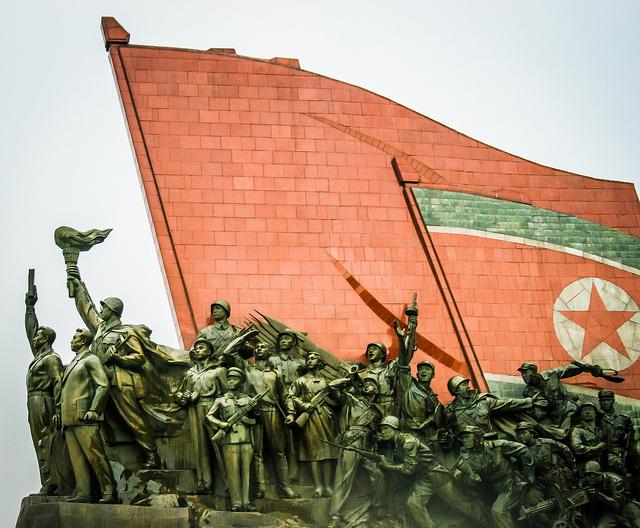
Earlier this month, North Korea carried out its fifth nuclear test—its second this year. Judging by the tremor detected, it was the North’s most powerful nuclear device ever. The question now is how the international community should respond.
That question has become all the more acute because, though North Korean reports aren’t exactly reliable, the propaganda that accompanied the latest test hinted that the North was testing a weapon design, not just an explosive device. And, as South Korean officials have suggested, it may not be the last test of this year. In other words, North Korea may begin to stockpile weapons of mass destruction.
Not only have the North’s recent nuclear tests been more powerful than those of previous years; they’ve also been conducted alongside an equally robust series of tests of ballistic missiles, including submarine launches and multi-stage rocket launches, with much more powerful engines. This means that North Korea may be close to perfecting a delivery system for whatever weapons it’s developing.
No one can say for sure whether a deliverable weapon will come from North Korea in the next two years, four years, or later. But there is little doubt that the North Koreans are not just seeking attention; they are seeking a powerful bomb and the means to use it.
As expected, the international community has unvaryingly condemned the tests. But not everyone agrees on what else to do. Some observers, including New York Times contributor Joel S. Wit and former intelligence officer Scott Ritter, declare that now would be an appropriate time to initiate talks with the North Koreans.
The logic behind such suggestions seems to come down to, ‘What have we got to lose?’ The answer is simple: plenty.
Such talks—‘dialogue’ as the Chinese often call it—would most likely bring with it a general acceptance of North Korea as a nuclear-weapons state. Moreover, the North would be unlikely to engage in any such talks, much less impose a moratorium on weapons tests, unless some of their longstanding demands—such as the suspension of joint military exercises by the United States and South Korea—were met.
This Realpolitik approach, some seem to believe, will somehow diminish whatever power the North Koreans wield, essentially disarming them. But the truth is that the North has done nothing to earn such appeasement. And, in fact, if the international community were to make any such conciliatory gestures, the result would be a bolder North Korea.
But there’s a good reason why the international community—and the United States, in particular—has refused to agree to North Korea’s terms, particularly the suspension of US–South Korea military exercises. Joint military exercises are an essential part of any alliance. If two countries agree to mutual defence, they need to ensure that their cooperation is practiced and perfected. That is precisely why North Korea, which knows a thing or two about the need for tests and exercises, has made the issue a top propaganda priority.
Instead of giving into such demands, the US has long held that it will engage in talks with North Korea only if they are based on previous agreements, including the September 2005 joint statement, which obliged the North to abandon all nuclear programs. This is a sensible position. After all, launching new talks that ignored past obligations would cast doubt on the viability of any new accord.
To be sure, pursuant to a February 2007 agreement, North Korea did take concrete steps to disable its nuclear facilities, including demolition of the cooling tower at its main atomic reactor in the Yongbyon Nuclear Scientific Research Center in June 2008. Such measures were supposed to brake the country’s nuclear momentum, by ensuring that restarting the program would be costly—perhaps even prohibitively so.
But, by restarting its nuclear program without rebuilding the cooling tower, North Korea has avoided many of those costs. Kim Jong-un’s regime—which has as little regard for the environment as it does for international rules and norms—simply called for the steaming water used to cool the reactor to be dumped into a nearby river.
Against this background, the argument for talks is weak. After all, negotiations are simply a means to an end, and if that end is unclear or unlikely, it makes little sense to engage in them. Instead, the international community should reject North Korea’s demands outright, ending the regime’s fantasy that the world will simply accept it as a nuclear-weapons state.
Fortunately, the international community’s response to North Korea’s nuclear ambitions generally aligns with this imperative. What’s needed is more cooperation with China on sanctions enforcement, as well as deep and quiet talks with the Chinese that aim to address any strategic mistrust over the eventual political arrangements on the Korean Peninsula.
The US should also continue to strengthen its security relations with Japan and South Korea, including by developing and deploying antiballistic missile systems. Direct measures like those that were allegedly used to hamper Iran’s nuclear program should be explored and accelerated.
None of this is to say that engaging North Korea is not an option. On the contrary, previous agreements should remain on the table. The September 2005 deal addressed North Korea’s key national interests: it gained assurances of peace and diplomatic recognition, in exchange for the dismantling of its nuclear program.
If the Kim regime really wants an opportunity to join the international community, it has everything it needs, written, agreed, and ready to be implemented. If, however, it wants to continue its march toward nuclearisation, it should know, beyond a shadow of a doubt, that it will remain a pariah. Its status as a nuclear-weapons state will never be accepted.